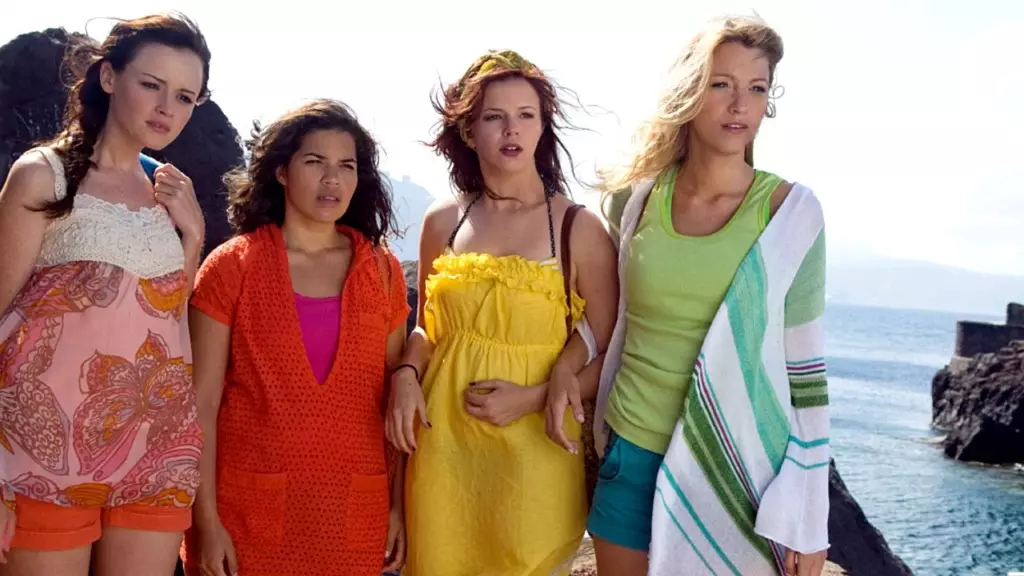In a world where the entertainment industry often grapples with allegations of misconduct, the recent events surrounding Blake Lively have stirred significant discussion, especially among her peers. The star, known for her role in “Gossip Girl” and the acclaimed “Sisterhood of the Traveling Pants,” has found herself at the center of a controversy involving accusations against director Justin Baldoni. Through a unified voice, Lively’s longtime friends and co-stars, America Ferrera, Amber Rose Tamblyn, and Alexis Bledel, have expressed their unwavering support for her, invoking themes of friendship, solidarity, and the crucial fight against workplace harassment.
At the heart of this unfolding drama lies a lawsuit filed by Lively against Baldoni, the director of the film “It Ends With Us,” which tackles sensitive subjects such as domestic violence and female empowerment. In her complaint, Lively claims that Baldoni’s behavior on set was not only inappropriate but also indicative of a broader culture of harassment. Among the allegations are claims of improvised sexual content and invasive conversations that made Lively uncomfortable. These accusations brought to light an unsettling aspect of the film industry where even established female figures can feel vulnerable and exposed despite their success.
The nature of Lively’s claims is undeniably alarming, as they suggest a calculated approach by Baldoni to undermine her credibility. It is chilling to think that behind the façade of camaraderie and professional collaboration, there exists a potential darker current of control and intimidation. According to the lawsuit, Baldoni allegedly worked with a crisis PR team to orchestrate a campaign to smear Lively’s reputation following her demand for a safer working environment.
The joint statement from Ferrera, Tamblyn, and Bledel serves multiple purposes: it validates Lively’s experience, showcases the strength of female friendship, and confronts the appalling hypocrisy of a situation where a director claiming feminist values has been implicated in actions that are antithetical to those very principles. Their solidarity is a reflection of a robust movement within the industry where women are beginning to hold abusive power dynamics accountable.
It is crucial to recognize the significance of such public declarations of support. When women in the entertainment industry rally for one another, it sends a powerful message not only to those within the industry but also to the wider community. Public figures carry weight, and their readiness to defend a friend and colleague sets a precedent, encouraging others to speak out against misconduct without fear of retribution.
Lively’s fight underscores a pivotal aspect of modern work culture—demanding safe and supportive environments. The Hollywood narrative has historically romanticized the concept of the ‘tortured artist,’ often overlooking the human cost of such toxic workplaces. However, the tide is changing as creators must recognize that creativity thrives in honest, respectful, and safe settings. This requires a collective effort from all stakeholders in the industry, including producers, directors, and co-stars, to cultivate environments that prioritize well-being and respect.
Moreover, the paradox of producing content that speaks against domestic violence while engaging in troubling behavior off-screen elucidates the need for significant introspection. Baldoni’s alleged actions starkly contradict the themes of empowerment portrayed in “It Ends With Us.” This contradiction serves as a reminder that while films can strive to inspire, the practices behind the scenes must align with the narratives they attempt to tell.
As we witness the unfolding of these events, it becomes evident that the film industry is at a critical juncture. The response from Lively’s associates, alongside the backing of the novel’s author Colleen Hoover, invites reflection on the culture of silence that has historically permeated Hollywood. Their actions not only support Lively but also echo a broader call for systemic change.
This controversy serves as a rallying cry: as spectators, followers, and participants in the industry, it is our duty to support those who stand against injustice, whether in Hollywood or any problematic workplace. It serves as an invitation to engage with the material produced, not only as entertainment but as a lens through which we can evaluate the evolving discourse around women’s rights and workplace ethics.
As this situation evolves, we must continue to shed light on these conversations and strive for a robust culture that values dignity and respect for all. In the end, it is the unity and courage of individuals like Blake Lively and her friends that will ultimately change the narrative.


Leave a Reply